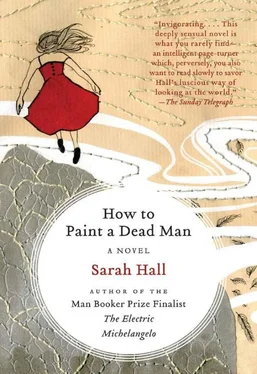When Mauri collects her in the afternoon his mood has improved considerably. He calls to her. ‘Rapunzel! Rapunzel! I am here to rescue you!’ He climbs out of the van giggling like a schoolboy, and scoops up Annette’s loose hair between his fingers. He bends her backwards in a dancing dip. Elemme calls over from the thrifts, ‘Hey, Annette, I think your brother is drunk.’ The stall is carelessly packed away, flower stalks are snapped, and Mauri drives very slowly and very badly to the greenhouses. Occasionally there are small swerves, as if he is avoiding objects in the road. ‘Is something wrong with the van?’ Annette asks. ‘Yes, it’s not a Ferrari! It’s not a Mercedes!’ He dissolves into laughter again and she begins to think he has been drinking as Elemme suggested.
At the entrance to the gardens he stops the van and leans over and puts his arm around Annette. ‘Did you take your hair down just for me? You do love me after all. I’m sorry I was angry. Give me a kiss. Everyone else is at it.’ She turns her face to kiss his cheek, but finds his mouth waiting instead, like a supple wet fruit. His lips are damp and loose as they press hers. Up close there is a bittersweet fragrance to his shirt, a scent with notes of almond and detergent. For a moment she feels a slight flush of dizziness. Is this how a real kiss feels? Mauri releases her. ‘Oh,’ he says. ‘No touching tongues at the greenhouses. Not unless we want a visit from you-know-who!’ His tone is neither playful nor serious. He is not tormenting her, but Annette is not certain he is joking.
The van recommences its weaving journey and brakes suddenly outside the little brick office and the engine stalls. Mauri opens his door and jumps out, his boots thudding on the ground. Annette’s door is opened by Uncle Marcello, who takes her hand and helps her down. ‘I’m sorry, I shouldn’t have let him drive. But look at you, with your radiant golden hair. Are you going to photosynthesise our plants?’ Annette takes hold of her uncle’s elbow. ‘I think Mauri might be unwell.’ Uncle Marcello sighs. ‘No. Unfortunately, your brother has become stupid with toxic vapour. It’s on his sleeve but he won’t change his shirt. He’s such a clumsy fool. He spilled chloroform everywhere. Now he is killing his brain and he thinks it’s hilarious.’ Her uncle sighs again then calls over to Maurizio, who’s humming a waltz and shuffling his feet by the pomegranate tree. ‘Go and walk around, idiot boy! Get some air into that stupid brain! Go and dig or do military jumps, I don’t care!’
When she was seven, Annette was given gas at the dentist for the extraction of four back teeth. The dentist placed a mask on her face and the gas made it impossible to feel anything inside her mouth or to be sensible. The procedure seemed only to take a few seconds, though her mother said it had been longer. The gas had bent time. When she came round she was violently sick into a bowl that her mother held. ‘Will Mauri be OK?’ she asks. Uncle Marcello places a hand on the back of her head and strokes her hair. ‘Yes, princess, but he’s going to have a very bad headache. And you? Did you feel all right this morning, after your restless night? I’m sorry if I disturbed you.’
They proceed into the office. Annette can feel the breeze passing through — the two tin-framed windows have been wound open as far as they will wind. She can smell the bitter-sweetness again, a smell that gets into her throat and pads it out with cotton. Under this is the smell of soil, worms, and fertiliser. She hears a metal bottle cap being screwed, the quick wash of liquid as it is upended against the neck. ‘I’d better put this somewhere safe where your brother can’t get at it.’ The wind in the cabin flutters the papers stuck to the wall. Annette wonders if the little English fairies on the postcards are drowsy too.
The battle against the greenfly has been a success, her uncle tells her. The ones in the trays have been destroyed, and their larvae poisoned. But they will have to wait to see whether the flowers can withstand such a harsh measure. Her uncle gently takes hold of her face and kisses her, once on each cheek. He sighs. ‘It’s a difficult balance between salvation and harm,’ he says. ‘We should always try to move forward, but sometimes that upsets everyone! I just hope we’ve done the right thing, Netta.’
Translated from the Bottle Journals
As predicted, there has been much commotion today. I have three nurses and they do not accede on matters of care. Theresa believes most ardently in the restorative power of soup; Florio, rest. Antonio sees that I wish to work and tries to defend my position, but the other two have interpreted his motivation as financially beneficial to himself, taking, as he does, a percentage of any sales. They do not mean to be unkind. It is simply the tension of the situation. Finally they have all agreed on the virtue of fresh air. They have moved an armchair into a square of sunlight on the veranda. I have been here all morning with a blanket on my knees though it is still very warm. The radio sits on a small table nearby and a bowl of fruit and my cigarettes. There are sunshades clipped to my spectacles. From here I can see the mountains. I have my tobacco and some books and it is quite a haven, or it would be if it weren’t for the continual disturbance.
Theresa visits my little oasis every fifteen minutes, as if it is a watchtower. You are missing your holster and your pistol, I say to her. Why don’t you go and patrol the garden? She fusses. She adjusts the blanket. She brings more soup and suggests I take a nap. I do not want to sleep through midday, I tell her each time. I am not a Spanish restaurateur. Antonio has gone into town to make some telephone calls. I suspect he is escaping the relentless dominion of Theresa. Florio is adjusting the pressure of the oxygen tank. The intention was to bring the device here twice a week for treatment, but the struggle to get it up the hill was so great that the doctor is leaving it at Serra Partucci for the duration of my illness. Perhaps I should rephrase — the duration of my life. Poor Florio. He does not have the waist of a young man any more. He brought the tank on an upright barrow, but the wheels ground into the path and we could hear him cursing and kicking the frame on the ascent. Antonio went to assist. When they arrived Florio was purple in the face and mopping his brow. He could not speak but bent over and flailed one hand until Theresa provided him with a glass of water. I thought he would have a stroke and expire at my feet.
I took some oxygen. It made me very light-headed for a while. There is a triangular mask that fits over the face and is secured with a band. The valves hiss when they are open. I am uncertain of the benefits. The cancer is inoperable and it is simply a matter of time. But Florio insists it will prolong things and grant me some relief. Theresa, though, is now convinced of my dementia. The initial flow of gas was too great. After inhaling it, I believed I saw Benicio lazing in the garden, his head on his paws. He turned and bit his tail as if biting fleas. I was overjoyed to see my old dog and I called out to him. Theresa crossed herself and then put a hand on my forehead. Florio is making sure the gas exits the tank more slowly in future.
They believe me to be optimistic in my outlook. And I am content, except for the fuss. The discomfort is permanent, and the symptoms are invariable. I cough. I wheeze. I move as if lamed and cannot clear my throat satisfactorily. I lie through the night, awake. But it is tolerable. My mind is a little looser I suppose, as befits such a condition. This world is coming to a close. Perhaps, after all, it was Benicio’s phantom I saw. He was always the best of guardians.
Читать дальше












